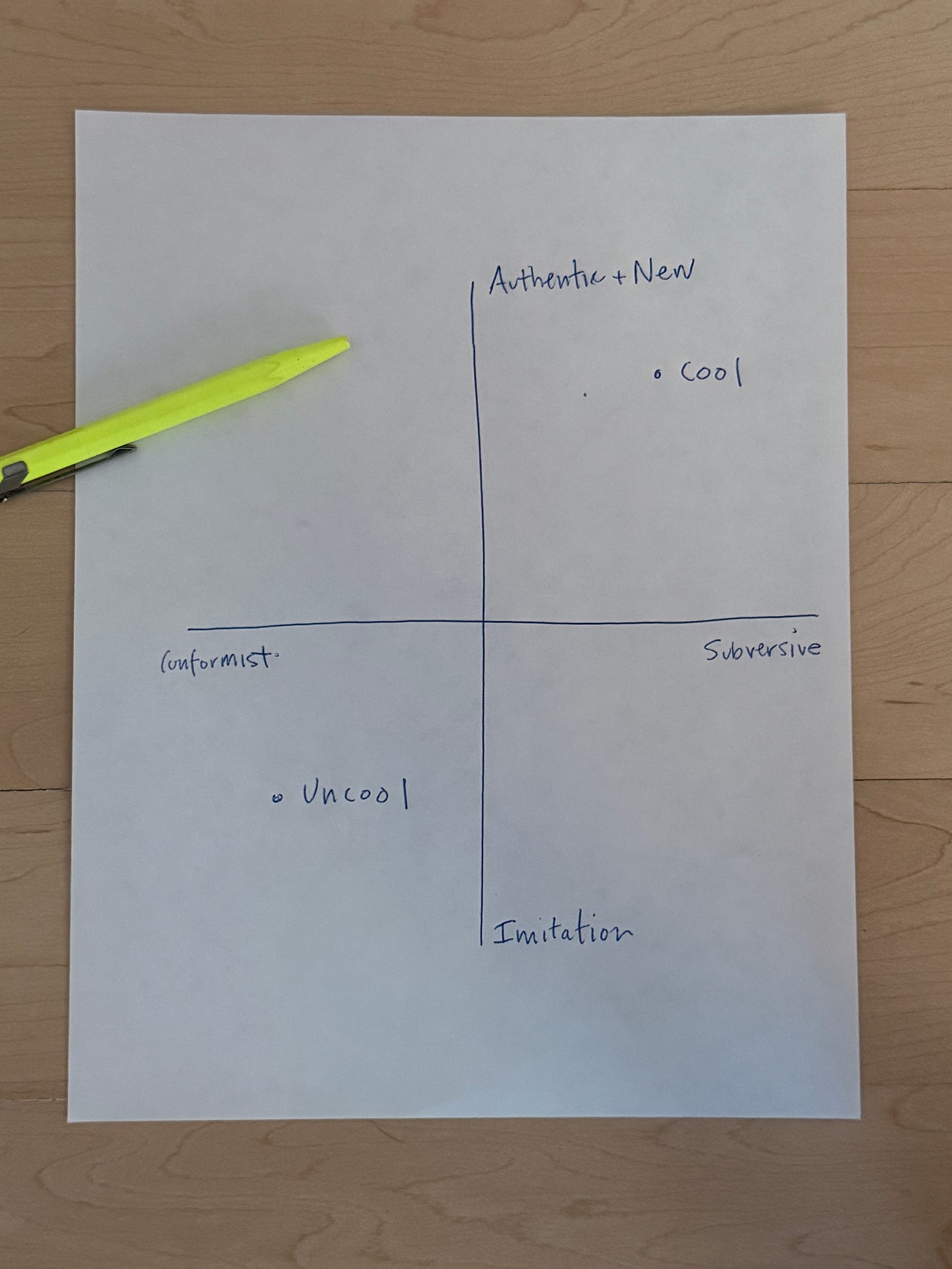AI Will Automate Everything Except Cool
The more AI tries to imitate us, the more we’ll crave the messy, handmade, and sincere.
POD 153: It’s Cool to Be Human
AI companies are trying to be cool. This week, we talk about Anthropic’s humanist branding, the fading idea of cool in a fractured culture, and why Gen Z’s nostalgia for the analog world might be the real rebellion. Plus: Anonymous Banker joins to break down why the math behind Paramount buying The Free Press for $150 million includes “free severance” as it will push out many CBS News workers.
Out Friday AM. Listen.
PVA CONVERSATION
Brian: AI can never be cool.
Coolness is a squishy societal concept that’s rooted in rebellion against a mainstream to assert personal autonomy. In a monoculture, it was easier to spot cool. It’s much harder now in an algorithmic-mediated culture that’s fractured into tons of subcultures.
AI companies have an interesting brand problem. They’re promising to overturn society with uncertain impact, and the popular imagination of it is tied up in job displacement and commoditization of culture. Anthropic’s “Thinking” caps, distributed through its “brand residency” (not cool) at Air Mail’s West Village shop, was a stab at making its AI chatbot Claude cool.
It’s an impossible task. Delia Cai has a righteous screed about this. “Grow up and stop wasting our precious, precious attention trying to convince the rest of us that your robot thingy is cool, actually (or less evil than the others), or that Tech Company Maybe Nice,” she writes.
AI will inevitably become the new mainstream, and cool will be the rebellion against it. The yearning for something lost by young people, forever the arbiters of cool, is manifested in the odd popularity of shows like Friends, CDs and flip phones.
I’m over 50, so I don’t get a vote on coolness. Young people have grown up in the personal optimization era, and coolness comes from detachment. Being extremely online is extremely uncool. Talking to your AI Friend will never be cool, no matter how many billboard ads are bought with VC dough. Needless to say – apologies to Alex – wearing an AI headset in public is not cool.
Instead, I am placing my money on sincerity as the new cool. Giving a shit is cool. Making stuff with your hands is cool. Putting in the work to learn how to play an instrument is still cool. Hanging out with real humans is cool. All those things are assertions of personal autonomy. The new monoculture is technology that hijacks our human agency.
Troy: I tried to make an uncool 2×2 to capture the essence of cool.
I don’t know if AI is conformist or subversive. It’s a cool tool. I guess it can be whatever you want it to be. If, in the end, it’s root ambition is to replace us, I suppose it is inherently subversive. It’s only authentic to the extent that it is an authentic imitation of human faculty. This model sucks. Let’s move on.
Brian, you are suggesting that AI will never be cool because it is, at its essence, anti-human. Who wants Artificial General Intelligence? Even Artificial sugar is not cool. Superintelligence! That sounds cooler. I pulled a definition from the AI: “the hypothetical intelligence of a machine that surpasses humans in virtually all cognitive tasks, such as creativity, problem-solving, and reasoning.” Surpassing us? In creativity? That doesn’t seem very cool.
Naturally, Anthropic, as any good tech marketer would, is trying to reframe things a bit. They’ve sensibly taken the safety first / human first message. Kinder, gentler AI. AI as thinking partner. Technology that accelerates human progress rather than replacing human intelligence. Look at the cap we made for our New York pop-up at that place that employs real life writers! THINKING! You are doing what you are supposed to do! We’re cool because we are the non-threatening AI, we have a gentle aesthetic and we like creative people like you.
The same vibe runs through OpenAI’s recent campaign — this one sweetened by the nostalgia of Simple Minds’ “Someone Somewhere in Summertime.” I love that song. It was made by humans.
Platforms are not cool because platforms are about power. Cool tech, on the other hand, can be very cool. Useful is cool. Smart is cool. Inherent beauty, craft, and technical wizardry are cool. Curious is cool. Steve Jobs was the OG Silicon Valley cool nerd because he represented a holy trinity of uncompromising design, utility and fearless innovation. Google may feel uncool now, but in its day, it made functional cool. As technology shifted from IT departments to seductive consumer products, the nerds that made stuff earned their own special cool cred.
In success, the companies that make tools — even if they are super useful — climb their way to the top of a global power hierarchy and are never cool for long. I mean, the power they accumulate is cool, at least to some. Once you have the power, the sensible thing to do is convince you and me that they are here for us… to make us better. But the real seduction is power. I don’t care what you say: power is cool, especially to the people that have it, or those that crave it.
Sam Altman gets this. He did the podcast PR push this week (A16 visit here), not to convince the world that he or OpenAI is cool, but that they’re winning. Winning with better products, winning with 800M users, dangling the promise of winning in front of others who also want to win inside of their exploding ecosystem. Winning is cool.
In science and art and business, people will do cool things with AI. When they do, the AI makers will absorb the vibes and we will think they’re cool too. This is why they can’t wait for someone to use their machines to cure cancer — even while they make little video generation apps that waste time and give us things to send to our friends. They just hope too many people don’t talk to their chatbots and kill themselves before something really great happens to justify their position.
Who knows how things will land. Even if it turns out badly, AI’s raw testament to human ingenuity will forever be cool to me. That said, I doubt it will ever be cool enough to offer the kind of honest self-reflection Cameron Crowe captured in Almost Famous: “The only true currency in this bankrupt world is what you share with someone else when you’re uncool.”
Alex: I think we’re in a state of mourning when it comes to AI.
But we’re not mourning taste. We’re mourning things like effort. We’re mourning the story behind the work, the fact that things used to be hard and that difficulty made them rare. You had to hunt down the record, save for the gear, find people who cared enough to make something with you. Even the failures took commitment, and that gave them weight.
We’re also mourning the feeling of being connected by something big and momentous. Sports still has it. Taylor Swift has it. But most of culture now is fragmented, a few massive shared moments surrounded by millions of small ones aimed at narrow groups. The few to many model of media shines at big cultural moments, but social media and generative AI stink at it. They are built for targeting, for reflection, not connection. Sora worked because I could put me and my friends in the video, a brilliant move that shows where we’re headed. In the end, we want to watch ourselves. It’s not bad or good. It’s just change, and change often hurts.







So glad I found this (thanks to Jen Topping)
Very insightful, as always. Alex's point on effort reminds me a bit of Eugene Healey's thoughts on friction recently: "When there's no friction, there's no imagination. You're left as a pure consumer - a medieval king feasting in front of a court jester. You grow overstuffed and lazy upon your throne."